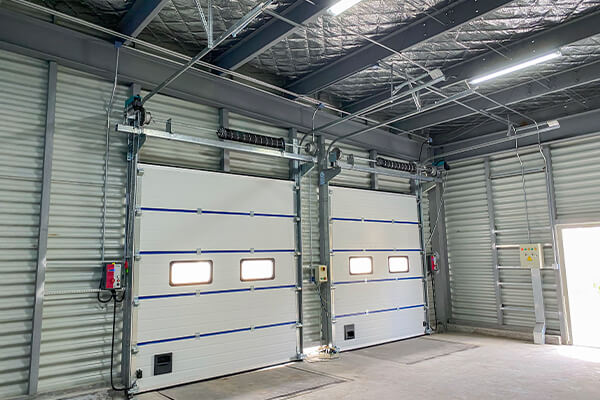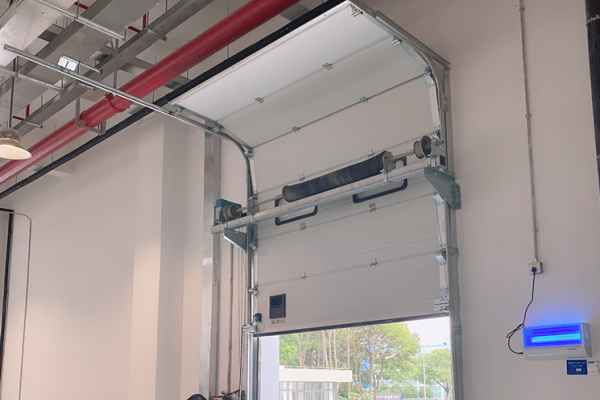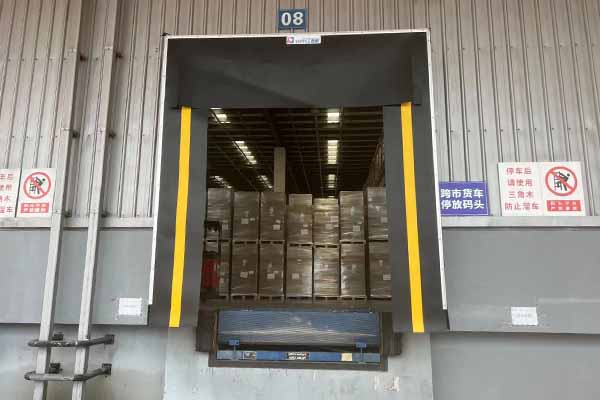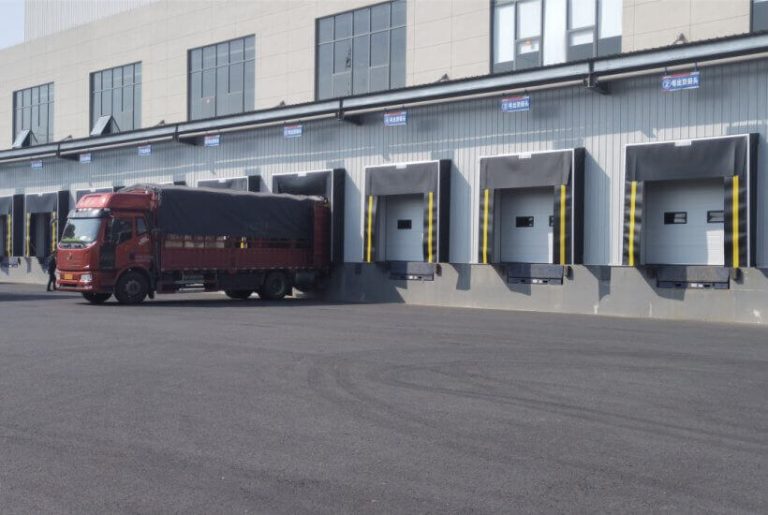In modern logistics and warehouse management, Loading Dock Equipment play a crucial role. These systems not only improve the efficiency of goods in and out, but also optimize the operation of the entire supply chain. Especially in factories, warehouses and distribution centers, the effectiveness of the loading and unloading system has a direct impact on production efficiency and operating costs. This article provides nine key points to consider when selecting a loading/unloading system to help you make informed decisions in response to changing market demands.
1.What is dock equipment?

A loading and unloading system is a series of equipment and facilities used for loading, unloading, handling and storage of goods. It includes dock levelers, industrial sectional doors, dock shelters, and cargo conveyors. Through this equipment, companies are able to efficiently connect transportation vehicles to warehouses, improve loading and unloading efficiency, and ensure the safety and integrity of goods.
In today’s fast-paced business environment, loading and unloading systems are not only a tool for operational efficiency, but also a key to rapid response to customer needs. They are used in a wide variety of industrial locations, especially in logistics centers that require high-frequency access, cold storage in temperature-controlled environments, and food processing plants with stringent cleanliness requirements.
2.Basic components of a loading dock equipment
The Dock Leveler system consists of several key components that ensure the efficient operation of each function:
船坞平整器
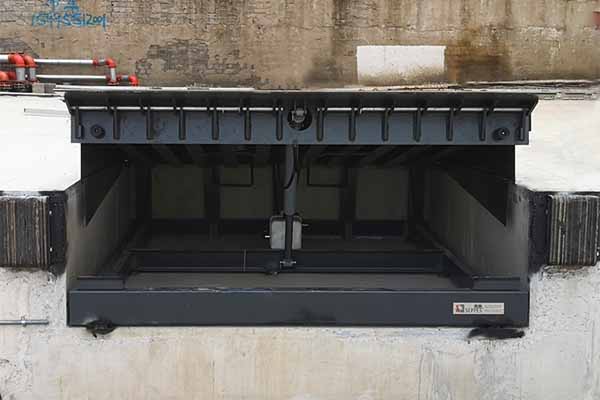
The dock leveler is the bridge between the truck and the warehouse floor, and can effectively resolve differences in height. They are designed to allow goods to move smoothly during the loading and unloading process, reducing handling losses. High-quality loading and unloading platforms usually have a carrying capacity of 6,000-8,000 kilograms, which is suitable for the operation of various heavy goods.
Industrial Sectional Door
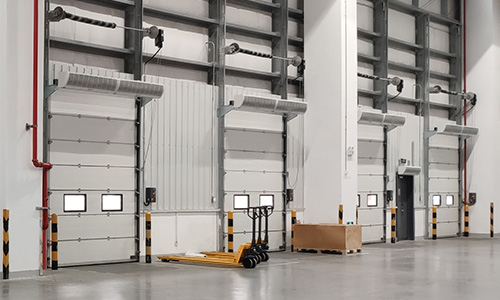
Industrial Sectional Doors provide secure access and are suitable for high-frequency access. They usually have good sealing and thermal insulation, can effectively block the influence of the external environment, to maintain a constant temperature inside the warehouse. The choice of door material, such as steel or aluminum, also affects its durability and safety.
码头庇护所
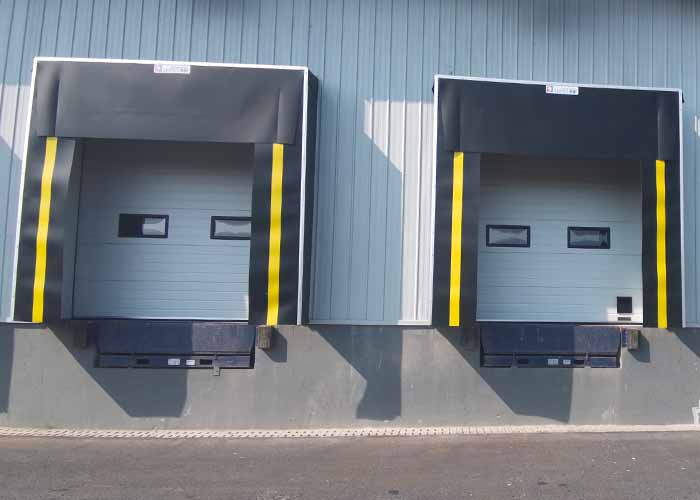
Dock Shelters are primarily used to protect loading and unloading areas and reduce the impact of outside weather on cargo. Typically installed around loading platforms, they protect cargo from rain, sand and extreme temperatures, ensuring smooth loading and unloading operations in all weather conditions.
Cargo Conveyors
Cargo conveyors play an important role in the loading and unloading process by automating the transportation of goods, greatly increasing operational efficiency and reducing the need for manual handling. They are especially common in large warehouses and sorting centers.
3.Basic classification of loading dock equipment
According to functions and application scenarios, loading and unloading systems can be categorized as follows:
Industrial loading and unloading platform
Dedicated to the loading and unloading of heavy goods, suitable for factories and large warehouses, able to quickly adjust the height, easy access to a variety of vehicles.
Specialized system for cold storage
Specially designed loading and unloading equipment to ensure that products are kept fresh and safe in cold chain logistics, in line with food safety standards.
Food industry loading and unloading systems
Meets strict food hygiene standards to avoid contamination and ensure food quality and safety.
4.Product technical parameters and recommendations
When selecting a loading and unloading system, you need to pay attention to the following technical parameters:
Carrying capacity
The loading capacity of loading and unloading platforms and lifting gates should be selected according to the actual use scenario, usually up to 6,000-8,000 kilograms, to ensure that they can withstand heavier goods.
Lifting speed
The speed of the lifting equipment affects the operation efficiency. It is recommended to choose equipment with a lifting speed between 5-10 cm/sec in order to complete loading and unloading quickly.
Material and Durability
The choice of material directly affects the durability and maintenance cost of the equipment, common materials include steel and aluminum alloy. High-quality materials can not only withstand greater pressure, but also resist corrosion and are suitable for a variety of environments.
Safety
Loading and unloading systems should be equipped with automatic response devices, such as sensors and emergency stop buttons, to ensure the safety of operation. Safety measures are especially important in environments with high frequency of entry and exit.
Recommended brands: Choose well-known brands such as SEPPES, Hörmann, ASSA ABLOY, etc. to ensure product quality and after-sales service.
5.Factors affecting the price of loading dock equipment
Price is an important consideration when choosing a loading/unloading system and is influenced by the following:
Type of equipment
Different types of equipment (e.g. Dock Leveler, Industrial Sectional Door) vary greatly in price, with loading platforms usually being more expensive.
Customization needs
Customization to specific needs increases costs. For example, customized equipment with special dimensions or features.
Technical complexity
High-tech equipment (e.g., automated systems) is usually more expensive, but also offers greater efficiency and convenience.
6.How to choose the right supplier of loading dock equipment?
Selecting a reliable supplier is essential to ensure the quality and service of your loading and unloading system. Here are a few key points to consider when choosing a supplier:
Market reputation
Choose a brand with a good reputation and credibility, check customer reviews and case studies to ensure the quality of their products and services.
Technical support and after-sales service
High-quality suppliers should provide comprehensive after-sales support, including regular inspection and maintenance, to ensure long-term stable operation of the equipment.
Customization ability
Suppliers that can provide customized solutions according to customer needs are more competitive.
7.Key points when shopping for dock equipment
When selecting loading dock equipment, the following key points require special attention:
Actual application scenario
Understand the specific use environment of the required equipment, such as cold storage needs good insulation performance.
Safety performance
Ensure that all equipment has the necessary safety features, such as emergency stops and automatic response devices.
Efficiency and energy consumption
Consider the efficiency and energy consumption of the equipment, and choose energy efficient equipment to reduce long-term operating costs.
8.Timing of selecting loading dock equipment
Project Planning Stage
Determine the need for a loading/unloading system as early as possible in the project planning phase so that it matches the building design.
Construction Phase
During the construction process, ensure that the equipment is in place in a timely manner and meets the design requirements to avoid delays.
Maintenance phase
Regularly inspect and maintain the equipment to ensure its long-term effective operation and to solve potential problems in a timely manner.
9.Prospect and Brand Recommendation
In the future, the loading and unloading system will develop towards intelligence and automation, and the equipment combining with the Internet of Things technology will become the mainstream and promote the progress of the industry.
Recommended brands:
SEPPES: Provides diversified loading and unloading systems, suitable for various scenarios.
Hörmann: Reliable quality, suitable for high-frequency use places.
ASSA ABLOY: outstanding performance in the field of intelligent door control technology, providing comprehensive solutions.
Through the above 9 key points, you can have a comprehensive understanding of the characteristics of the loading and unloading system, purchase considerations and brand recommendations, so as to make the best decision and ensure the smooth progress of the project. Choosing the right loading and unloading system not only improves efficiency, but also ensures safe and stable operation.


